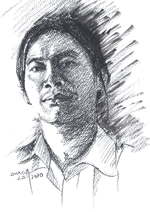
COMMENTARY
| By AUNG ZAW | Tuesday, July 19, 2011 |
In 1940, 25-year old student leader Aung San was contemplating revolution, including an armed struggle against the British rulers in his country.
He thought that international propaganda would be necessary, but knew the main work would have to be done inside Burma. His grand strategy was to mobilize the masses for a national struggle, including a series of strikes by industrial and rural workers leading to a general strike. To this end, he employed all forms of militant propaganda in his campaign against British imperialism, urging his compatriots to boycott British goods and refuse to pay taxes, while guerrilla actions were carried out against military and police outposts.
 |
| Aung Zaw is founder and editor of the Irrawaddy magazine. He can be reached at [email protected]. |
Aung San, who was then leading an underground resistance movement in Burma, finally took up arms and sought the support of the Japanese. He himself went to Japan with a select group of Burmese nationalists known as the “Thirty Comrades” to be trained on Hainan Island. Without the support of Japanese forces and the intensifying battles in Asia and the Pacific during World War II, Aung San and his legendary comrades would never have been able to reach Rangoon to fly the liberation flag.
Aung San had no illusions about his country and his goal. He was never seen as pro-fascist or as a pro-Japanese leader. He immediately saw that the Japanese “liberation” of Burma was merely gold-plated, and not the real thing. He saw the changing landscape in the international arena and the direction of World War II, and was pragmatic enough to exploit the situation and drive out the Japanese alongside British and Allied Forces. Why did he betray his Japanese “allies” to join the British enemy? Because he knew that ultimately this was the only way for Burma to achieve independence.
In 1945, just five years after he started forming his thoughts and strategy on armed struggle against British imperialism, Aung San found himself in the role of a national leader, despite his awareness of his poor communication skills with his comrades and the public. He was the one who led the negotiating team that went to London to discuss the terms of Burmese independence with the British.
Burma regained its independence in 1948, but the people of Burma lost their independence leader on July 19, 1947, when Aung San and members of his cabinet were gunned down by a political rival.
Fast forward 64 years, and Burma remains in a state of leaderless limbo. The country's military dictators have installed a new quasi-civilian regime following last year's sham election, and Aung San's daughter, Nobel Peace Prize Winner Aung San Suu Kyi, continues her fight to restore the country’s dignity, democracy and freedom, but neither side has shown any capacity to move the country forward.
During the student-led nationwide uprising in 1988, Suu Kyi reluctantly entered the fray, saying that as Aung San’s daughter, she could not remain indifferent to all that was happening in Burma at that time. Addressing hundreds of thousands of people who came to listen to her first speech at Shwedagon Pagoda, Burma's most sacred shrine, in September, she declared: “This national crisis could in fact be called the second struggle for national independence.”
Like he father, she has faced an uphill battle ever since she spoke those fateful words. This time, however, the adversary is not foreign colonialists but home-grown dictators who have reduced the resource-rich nation to the ranks of one of the world's poorest pariah states.
The question now is: can she beat the odds and succeed as her father did, or will her highly principled approach, which contrasts so starkly with Aung San's pragmatism, doom her struggle to failure?
At 66, Suu Kyi is now more than twice as old as her father was at the time of his murder. Since her release from house arrest last year, however, doubts have grown about whether she will ever be able to regain the momentum that propelled her party, the National League for Democracy (NLD), to electoral victory in 1990.
Since her meteoric rise in 1988, Suu Kyi has remained a guiding light for millions of Burmese.
1 | 2 
|
||
|
||
|
||
|
||
|
||
|
||
|
||
|
||


Thailand Hotels
Bangkok Hotels
China Hotels
India Hotels

|